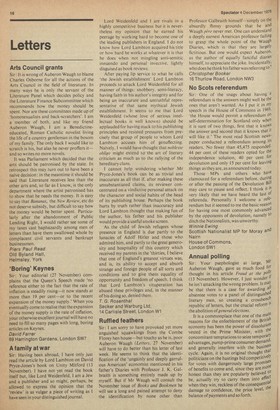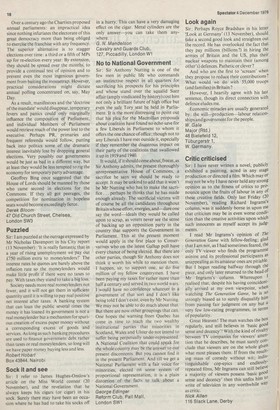Annual polling
Sir: Your psephologist at large, Mr Auberon Waugh, gave us much food for thought in his article Fraud at the polls (13 November). However, I just wonder" he isn't attacking the wrong problem. It mg, be that there is a case for awarding al; absentee votes to a panel of distinguisheo literary men, so creating a crossbench republic of letters, but the crucial reform Is the abolition ofgeneral elections. It is a commonplace that one of the mai° reasons for the enfeeblement of the British economy has been the power of dissolution vested in the Prime Minister, with the concomitant temptations to seize temporarY advantages, pump-prime consumer demand' and generally interfere with the business cycle. Again, it is no original thought that politicians on the hustings bid competitivelY for votes with dangerously large promises of benefits to come and, since they are more honest than they are popularly believed to be, actually try to carry them into effec! when they win, reckless of the consequential damage to confidence, the price level, the balance of payments and so forth.
Over a century ago the Chartists proposed annual parliaments: an impractical idea since nothing infuriates the electorate of this great democracy more than being obliged to exercise the franchise with any frequency. The superior alternative is to stagger elections over time: a third or a fifth of MPs up for re-election every year. By extension, they should be spread over the months, to provide a continual test of opinion and to prevent even the most ingenious government from baiting the mousetrap. However, practical considerations might dictate annual polling concentrated on, say, May Day.
As a result, manifestoes and the 'doctrine of the mandate' would disappear, temporary fevers and panics could only marginally influence the composition of Parliament, and individual Members of Parliament would retrieve much of the power lost to the executive. Perhaps PR, primaries and frequent referenda would follow, putting back into politics some of the dramatic interest inevitably lost by dropping general elections. Very possibly our governments would be just as bad in a different way, but at least they would be less tempted to rig the economy for temporary party advantage.
Geoffrey Bing once suggested that the House of Lords should be manned by those who came second in elections for the Commons. If they all got peerages, the competition for nomination in hopeless seats would become exceedingly fierce.
Derek Bloom • 47 Old Church Street, Chelsea, London SW3







































 Previous page
Previous page